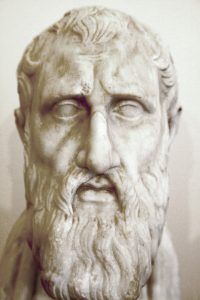The Stoic conductor
integrating an age-old philosophy into the conductor’s work
I’m interested in the idea of the Stoic conductor. I started reading further, especially as a result of the number of podcasts I have made, and in particular the podcast with Kevin Houben. By reading various books and articles, I returned to one of my old interests: Stoic philosophy. During my studies in musicology I came into contact with many forms of philosophy, many of which are very abstract, structuralist, or systemic. But this philosophy is about life, about emotions and how to deal with them. Funnily enough, it also seems to anticipate psychology and Cognitive Behavioural Therapy in particular. In any case, it has already helped me enormously to be busy with a number of things. No, I’m still an emotional person and easily panicked, but it’s a work in progress!
The conductor
The role of a conductor is both intense and complex. It requires a combination of musicianship, leadership and emotional intelligence. In this light, Stoic philosophy, with its emphasis on inner peace, self-control, and rational thinking, can provide valuable guidance for conductors. In this article I explore how the four core virtues of Stoicism can be applied to the daily practice of conducting.
What is Stoic Philosophy?

Stoic philosophy (named after the columns — Stoa — at the Agora of Athens), which originated in Ancient Greece (probably by Zeno of Citium) and further developed in Rome, focuses on cultivating virtue and achieving a state of inner calm through rational thinking and self-control. Important figures such as Epictetus, Seneca, and Marcus Aurelius shaped the core ideas of Stoicism. The four cardinal virtues of Stoic philosophy are: Wisdom, Courage, Justice, and Temperance.
Wisdom (Phronesis)
Wisdom, or practical wisdom, is the ability to make right judgments based on experience, knowledge, and moral integrity. For a conductor, this means making decisions that benefit both the orchestra and the audience.
Practical example: When choosing a program for a concert season, a conductor may choose to find a balance between well-known works and new, challenging compositions. This requires an understanding of both the orchestra’s capabilities and the audience’s tastes, as well as an ethical awareness of the importance of artistic growth. A wise conductor will make these choices with a deep understanding of the musical and social context.
Courage (Andreia)
Courage in Stoic philosophy is about facing fear and uncertainty with determination and strength. For a Stoic conductor, this may mean daring to introduce new and unfamiliar pieces of music or making difficult decisions during rehearsals and performances.
Practical example: A conductor may decide to perform a modern, lesser-known work that presents technical challenges for the orchestra. This may initially cause resistance from the musicians and the audience. However, by sticking to his artistic vision and leading the orchestra through the challenges with confidence, the conductor shows courage.
Justice (Dikaiosyne)
Justice is about fairness, equality and treating others with respect. A fair conductor ensures that all members of the orchestra feel valued and treated fairly.
Practical example: During rehearsals, a conductor can ensure that all sections of the orchestra receive equal attention and that soloists are not always the same people. By distributing opportunities evenly and listening to the needs and concerns of all orchestra members, a conductor creates an equitable and harmonious work environment.
Temperance (Sôphrosynê)
Moderation or self-control means keeping one’s emotions and desires in balance and not being carried away by external circumstances. For a Stoic conductor, this means remaining calm under pressure and the ability to regulate emotions, even during intense rehearsals or performances.
Practical example: When preparing an important performance, unexpected obstacles may arise, such as a sick soloist or technical problems. A Stoic conductor will approach these challenges with calmness and a solutions-oriented mindset, without being drawn into panic or frustration. By showing moderation, he can effectively lead his orchestra through stressful situations.
Conclusion: the Stoic conductor
Stoic philosophy provides a valuable framework for conductors who strive for harmonious and effective performance of their work. By integrating wisdom, courage, justice, and temperance into their daily lives and work, conductors can not only improve their own performance, but also exert a positive and stable influence on their orchestra. In the complex world of music performance, stoicism can serve as a compass for inner peace and professional success. A final comment is in order, the Stoic conductor is not an ideal, but always remains a work in progress, just as philosophy itself prescribes. In a next blog I will try to go into more detail about the different virtues and how you can use them.
Learn more about Stoic philosophy
A huge source on contemporary Stoicism is the Daily Stoic
Read from the original sources:
- The Meditations – Marcus Aurelius
- Enchiridion – Epictetus
- Letters from a Stoic – Seneca
In addition to the books of Epictetus, Seneca and Marcus Aurelius, there are a number of very accessible books that will be of great use to you, I recommend the following list:
- Courage is Calling – Ryan Holiday
- Discipline is Destiny – Ryan Holiday
- Right Thing, Right Now – Ryan Holiday
- How to Think Like a Roman Emperor – Donald J. Robertson



